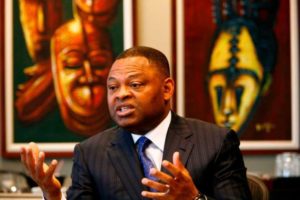 With a net-worth of over three billion dollars ($3 Billion+) Nigerian born oil and Gas baron, Kase Lawal comes after David Steward, Oprah Winfery and Robert Smith as the fourth richest black person in America
With a net-worth of over three billion dollars ($3 Billion+) Nigerian born oil and Gas baron, Kase Lawal comes after David Steward, Oprah Winfery and Robert Smith as the fourth richest black person in America
While other major oil companies have dominated the news for everything from overpaid-CEOs to accounting scandals, Kase L. Lawal has been quietly building a gas and oil empire. Nigerian-born Lawal is CEO and chairman of Camac Holdings Inc., an oil and gas exploration and refining company based in Houston, Texas. Since 1986, with a combination of hardcore business sensibilities and extensive African contacts, Lawal has built his family-owned firm into a billion-dollar business. Ranked number one in 2002 and 2003 on Black Enterprise’sprestigious list of the top 100 black-owned firms in America, Camac Holdings had offices throughout the world and employed over 1000 people. Lawal’s success has spurred him to help open up the lucrative oil business—a traditionally white, male domain—to other people of color. “I want to encourage more blacks to get involved in the oil industry as entrepreneurs,” he told Black Enterprise. Left Africa to Launch Life in America
Kase Lukman Lawal was born in Ibadan, Nigeria, to a local politician and a textile trader. He told the Houston Chronicle that when he was growing up he always knew he would be a businessman though he was not sure what that business would be. Even as far away as Nigeria, the Civil Rights struggle in America rung loud and clear. Lawal was fascinated and wanted to be a part of it. So, as his siblings went off to study in England, Lawal made plans to attend a university in the United States. “My father was absolutely opposed to me coming to America,”Lawal told the Houston Chronicle. “He feared for my safety and thought it would be hard for me to adjust to the American way of education.”
Update:
In May 2020, Nigeria sued an oil exploration production company, ALLIED ENERGY PLC , owned by Texas-based billionaire Kase Luqmon Lawal to demand $35.7million debt.
The suit was filed at a Federal high Court in Lagos by the oil minister, which is President Muhammadu Buhari.
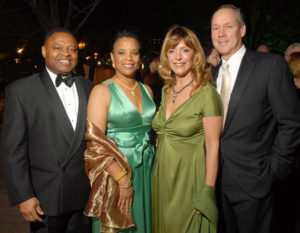 Lawal arrived stateside in 1972 and initially enrolled as a chemical engineering major at Georgia Institute of Technology. He soon switched to Houston’s Texas Southern University where he earned a bachelor of science in chemistry. He continued his education at Prairie View A&M University of Texas, earning a master’s of business administration (MBA) in finance and marketing.
Lawal arrived stateside in 1972 and initially enrolled as a chemical engineering major at Georgia Institute of Technology. He soon switched to Houston’s Texas Southern University where he earned a bachelor of science in chemistry. He continued his education at Prairie View A&M University of Texas, earning a master’s of business administration (MBA) in finance and marketing.
During Lawal’s early career he held a variety of positions, both technical and financial. He was president of Baker Kase Investments, a real estate mortgage and investment company and vice president of Suncrest Investment Corporation. On the technical side, Lawal worked as a research chemist for Dresser Industries and as a process engineer for Shell Oil Refining Company.
Kase Lawal’s house
Kase L. Lawal is the Chairman, CEO, and major owner of CAMAC International Corporation and chairman of Allied Energy Corporation. He also serves as a member of the board of directors and is a significant shareholder in Unity National Bank, the only federally insured and licensed African-American-owned bank in Texas. He owns this 15,264 sq ft home.
Tapped into African Agricultural Trade with CAMAC
Lawal founded Camac in 1986 after meeting a mathematics professor from Cameroon who was conducting a feasibility study for a cigarette manufacturing plant in that country. At the time, products being exported from the United States to Cameroon were routed through France, partly due to antiquated colonial ties and mostly because France had a tradition of financing Cameroon import initiatives. After meeting several
At a Glance…
Born in Ibadan, Nigeria; married Eileen Lawal; children: two sons, one daughter, Education:Texas Southern University, BS, chemistry; prairie View A&M University of Texas, MBA, finance and marketing.
Career: Camac Holdings Inc., Houston, TX, CEO and chairman, 1986-; Allied Energy Corporation, chairman; Baker Kase Investments, president; Suncrest Investment Corporation, vice president; Dresser Industries, research chemist; Shell Oil Refining Company, process engineer.
Memberships: Port of Houston Authority (commissioner and vice chairman, 1999–); United States Trade Advisory Committee on Africa; Houston Mayoral Advisory Board on International Affairs and Development (chairman); Board of Directors, Houston Airport System Development Corporation (vice chairman); Greater Houston Partnership (board member).
Kase Lawal Awards
Erns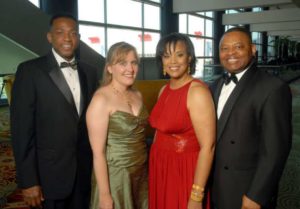 t & Young, Entrepreneur of the Year, finalist, 1994; USAfrica Community Service and Business Leadership Awards, Business Person of the Year, 1997; Center for Black Business History, Entrepreneurship, and Technology, Texas Black Business Hall of Fame, 2003; Prairie View Texas A&M University, Distinguished Business Leader Award, 2003,
t & Young, Entrepreneur of the Year, finalist, 1994; USAfrica Community Service and Business Leadership Awards, Business Person of the Year, 1997; Center for Black Business History, Entrepreneurship, and Technology, Texas Black Business Hall of Fame, 2003; Prairie View Texas A&M University, Distinguished Business Leader Award, 2003,
Addresses: Office —Camac Holdings, Inc., Southwest Plaza, Ste, 600, 4669 Southwest Fwy., Houston, TX 77027.
Times with the professor, Lawal, according to Forbes, “…saw the opportunity to cut out the expensive middle-man.”
Working directly with the American tobacco producers and the Cameroon processing company, Lawal financed a deal that allowed the tobacco to go straight from the U.S. farms to the African processing plant. With that, Camac Holdings—short for Cameroon American—was born. Focusing on international agricultural trade, mostly between the United States and Africa, Camac was an early success. The key was local partnerships. “We add financing and technical expertise, and they provide political landscape experience, relationships, and credibility,” Lawal told Forbes.
In 1989 another pivotal meeting occurred in Lawal’s life. Active in Houston’s Rotary Club, Lawal invited Rilwanu Lukman—a Nigerian politician and oil industry insider—to a meeting. Lukman urged Lawal to shift his focus from agriculture to oil. Though rich in oil, Nigeria was barely tapped into at that time. Few of the oil industry giants had developed the connections necessary to launch oil exploration projects. Capitalizing on his contacts in Nigeria, Lawal formed Allied Nigeria and secured the oil production rights to large tracts of land in the country. All he lacked was the money to finance the oil exploration.
Lawal met with oil industry executives from 19 different companies before partnering with Conoco in 1991. According to Forbes, the joint venture between the oil giant and Lawal’s family firm helped pump over $500 million dollars into Nigeria over the next decade. It also proved very successful and as late as 2002 was still producing over 20,000 barrels of oil per day. The partnership launched several oil exploration projects in Angola as well.
During the nineties, Lawal opened offices in Washington, D.C., Grand Cayman, Johannesburg, Lagos, and London. Camac Holdings also launched two major subsidiaries: Allied Energy and Oceanic Consultants. According to Black Enterprise, “[these firms] own stakes in inland and offshore oil and gas producing properties as well as interests in businesses that conduct drilling operations, oil transportation, technical advisory services, and construction for the oil industry in Africa, Asia, Europe, and North America.” Lawal added to that list in 1999, buying an oil refinery and established an energy trading company. Until that time Camac had been mostly limited to oil exploration and production. “We used to produce oil and rely on someone to sell it,” Lawal told Black Enterprise. “We decided that we could get contracts, and assemble a risk management team that could deal with the volatility of selling oil and gas.”
Rocketed to Top U.S. Black Business
By taking over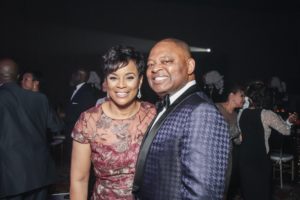 the trading of its products, Camac Holdings experienced phenomenal growth. Revenue jumped from $114.26 million in 1999 to $571.54 million in 2000. In 2001 revenues leapt to $979.5 million. 2002 pushed the company over the billion dollar mark, with $1,009 million in revenue. In explaining the company’s extraordinary financial gains, Lawal told Black Enterprise, “Our business is an integrated business in terms of providing upstream and down-stream services.” Upstream is anything related to the procurement of oil and gas—exploration and production—while downstream involves getting the product to the market—refining and selling. “The natural growth is always to get downstream to complement the upstream, that’s the logical step,” he said. “That’s where our growth has come from the past four years.”
the trading of its products, Camac Holdings experienced phenomenal growth. Revenue jumped from $114.26 million in 1999 to $571.54 million in 2000. In 2001 revenues leapt to $979.5 million. 2002 pushed the company over the billion dollar mark, with $1,009 million in revenue. In explaining the company’s extraordinary financial gains, Lawal told Black Enterprise, “Our business is an integrated business in terms of providing upstream and down-stream services.” Upstream is anything related to the procurement of oil and gas—exploration and production—while downstream involves getting the product to the market—refining and selling. “The natural growth is always to get downstream to complement the upstream, that’s the logical step,” he said. “That’s where our growth has come from the past four years.”
Camac’s phenomenal success caught the attention of the business world almost by surprise. In 2002 Camac Holdings Inc. landed at number one on Black Enterprise’s widely respected ranking of America’s top 100 black-owned firms. It was the company’s first appearance on the list. Until that time, Lawal had kept a very low profile. “I just didn’t see a reason to publicize the company,” he told the Houston Chronicle. In fact, it was his marketing staff that entered Camac in the Black Enterprise contest without his knowledge. “I wasn’t even part of the process,” he told the Houston Chronicle.
While he has remained behind the scenes with Camac, Lawal has been extremely active in civic affairs. He has long been involved in Houston’s efforts to increase international trade. In 1999 Lawal was appointed a commissioner of the Port of Houston. The largest American port in terms of foreign tonnage, the port also houses the country’s largest petrochemical complex. As Camac is a major user of the port, Lawal is in a unique position to address port concerns and increase port revenue. In 2000 he was elevated to the role of vice chairman of the port. He has also served as chairman of the Houston Mayoral Advisory Board on International Affairs and Development. The mayor also tapped Lawal to be vice chairman of the Board of Directors of the Houston Airport System Development Corporation.
On the nationa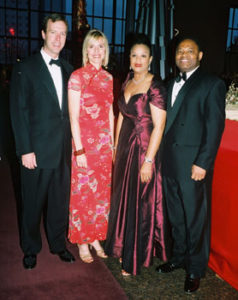 l level, in 1996 Lawal was appointed by the Secretary of Commerce to a position on the United States Council on the Business Development Committee of the United States-South Africa Binational Commission. Lawal told Forbes he was surprised by the appointment. “I asked [the secretary], what is a small businessman out of Texas doing on this big commission.”The reply was, “We know you’re from Africa. You must have an inherent interest in the continent and its well-being.” President Bill Clinton thought so too and appointed Lawal a member of the United States Trade Advisory Committee on Africa. In this role Lawal helped to develop trade policies in Africa—a subject that he knows first hand.
l level, in 1996 Lawal was appointed by the Secretary of Commerce to a position on the United States Council on the Business Development Committee of the United States-South Africa Binational Commission. Lawal told Forbes he was surprised by the appointment. “I asked [the secretary], what is a small businessman out of Texas doing on this big commission.”The reply was, “We know you’re from Africa. You must have an inherent interest in the continent and its well-being.” President Bill Clinton thought so too and appointed Lawal a member of the United States Trade Advisory Committee on Africa. In this role Lawal helped to develop trade policies in Africa—a subject that he knows first hand.
Kase Lawal’s Wives
Samira Sheriff is the former wife of the billionaire oil mogul, Mr Mohammed Indimi, and the mother of the popular indimi girls, Adam, Meram and Mairama indimi, she has three Stunning girls for the billionaire. Mrs Samira Sheriff is Chadian and Swiss.

Samira remarried billionaire Kase Lawal, whom she had a daughter for. The daughter’s name is Kunta Lena Lawal.
Her first husband Mr Mohammed Indimi is one of the richest man in Nigeria and Africa.
Though we won’t describe this as milestone for Mrs Samira Sheriff, but she was able to achieve this in her life time, because of her stunning beauty, which she did pass to her daughter’s.
Kase Lawal’s philathropy
Lawal has used his success to help others through philanthropic gifts both at home and in Africa. He and his wife Eileen, who shares Lawal’s 80 percent ownership of Camac, have been particularly generous with educational programs. In 1992 they established the Petroleum Engineering Endowment at the University of Houston’s Cullen College of Engineering. The $600,000 gift helps graduate petroleum engineering students. In 2003 the couple pledged $1 million to Texas Southern University to create the Kase and Eileen Lawal Center for International Business Development. The Lawals also regularly appeared on the Houston social circuit, chairing and attending many fundraising events. Lawal has also worked hard to promote cultural exchanges between Africa and the United States. For several years Camac has sponsored the Houston International Festival which celebrates ethnic food, art, and cultures from around the world. The company has also supported performances of groups as diverse as the Drummers of Burundi and The Dance Theatre of Harlem.
The Lawals and Camac have also contributed millions of dollars to programs aimed at improving the health and welfare of African peoples. They have supported everything from orphanages to local schools, however the bulk of their contributions have gone to fund HIV/AIDS research, prevention, and services. “I have a responsibility to the continent of Africa,”Lawal told Forbes. “I believe that in any small way I can, having been trained and given opportunities in the United States, I want to make a difference.”
With over 500 workers employed in Africa alone, Camac has already made a difference on that continent. By 2004 the company had plans to do much more. Lawal orchestrated a deal to purchase Blue Island Refinery in Illinois and relocate the equipment to South Africa. The $1.3 billion development project was expected to employ more than 2,000 South African workers. “Through Camac, I want to be one of the architects of black empowerment globally,” Lawal told Black Enterprise. That sentiment applied also to his adopted home town. As the mayor of Houston told the Houston Chronicle, “All kids can look at City Hall and say I can be mayor. But now, most are saying, ‘I want to be Kase Lawal.’ I look at the kids and say, ‘Me too.’”

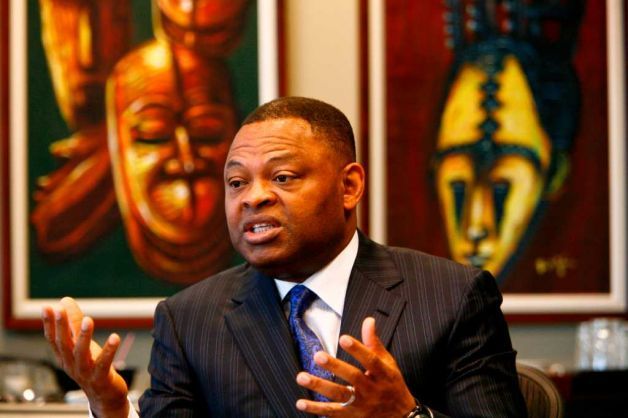


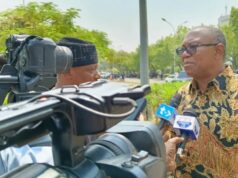
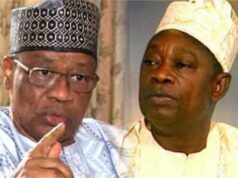



Nigeria is always on point
WE are a great resourceful people! Kudos to Life and Times for this spotlight
great inspirational story
Kase should be my Uncleooo, I need help in Dollars
This story brings gladness to my heart! It is very positive, a major change from the negative that’s always reported against us
I agree with you. People need to know the positive side of Nigerians. There are many of our people out there with good stories.
Great inspirational story, a grass to grace example..